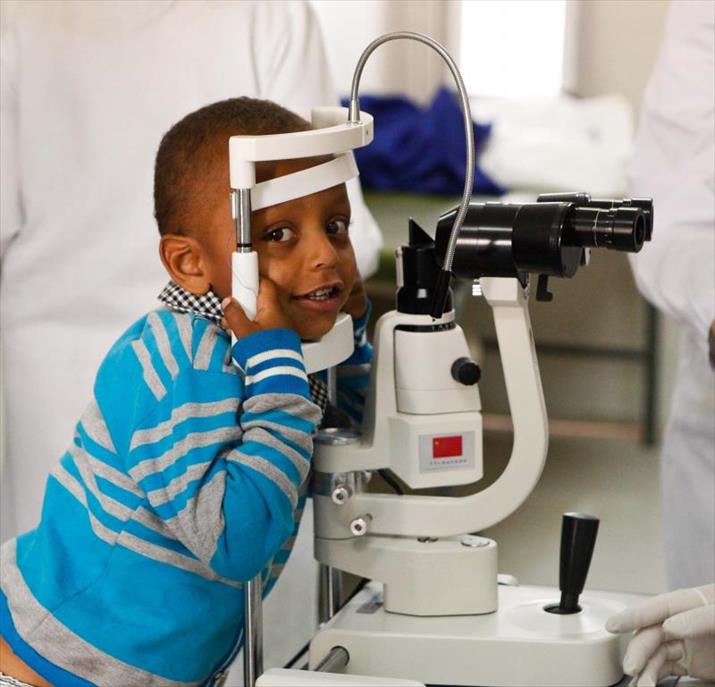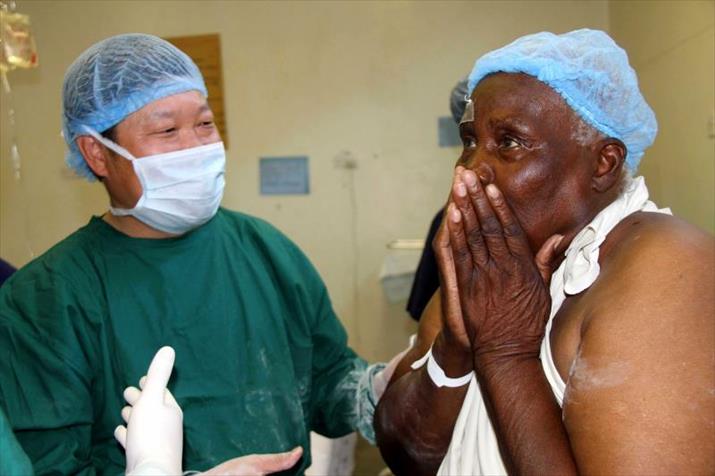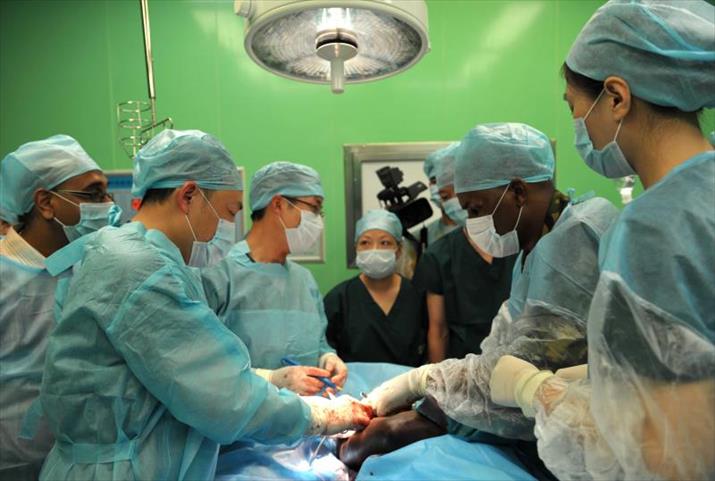|
||||||||||
| Home Nation World Business Opinion Lifestyle ChinAfrica Multimedia Columnists Documents Special Reports |
|
||||||||||
| Home Nation World Business Opinion Lifestyle ChinAfrica Multimedia Columnists Documents Special Reports |
| Africa |
| Increased Contribution |
| China is playing a bigger role in global health development |
| By Liu Jian | VOL. 9 May 2017 ·2017-05-03 |

When tech guru and philanthropist Bill Gates speaks, people generally listen. His endorsement therefore of locating the new Global Health Drug Discovery Institute (GHDDI) in China is a vote of confidence for the country's health sector. Citing the rich pool of talented scientists and its capacity to develop new drugs and vaccines, Gates said China was a clear choice for this important location. The move adds weight to the continuing progress China is making in contributing to global health development 45 years after the country resumed its legal seat at the World Health Organization (WHO) in 1972.
Gates made the announcement during his talk at Peking University on March 24, while on a visit to Beijing. The GHDDI was cofounded by Tsinghua University and the Bill & Melinda Gates Foundation (BMGF) in Beijing.
"China isn't just striving to reach new heights at home. It is using its own experience fighting poverty and disease to help other countries tackle similar challenges. Now, China is using its experience to help usher in a new tomorrow for Africa," said Gates, Co-Chair of BMGF.
Bigger role in global health
Gate's comments on China's contribution to the world health development was echoed by Dr. Bernhard Schwartländer, WHO's Representative in China, who believes that China's health reforms can serve as a good example for other developing countries.
Schwartländer praised China's direct contribution to global health, highlighting its remarkable decades-long medical assistance to Africa. He noted that more than 23,000 Chinese medical staff have worked in 66 countries and regions around the world and have treated an estimated 270 million patients since the country sent its first medical team to Africa in 1963.
China has been taking the lead in helping the WHO, with a recent example being its assistance in fighting Ebola. It was among the first to deliver emergency support to Ebola-hit countries, with more than 1,200 health professionals dispatched to West Africa, he said.
"China will be part of a larger network of emergency medical teams that the WHO can call upon in case of global emergencies. They can be quickly dispatched and help our efforts to overcome a crisis," he added.
In recent years, this cooperation has been extended to disease prevention and control programs, such as malaria control. Gates pointed out that one area China has an incredible chance to lead in is in reducing and eventually eradicating malaria.

"To achieve the goal of global eradication, we need to build on Professor Tu Youyou's discovery of artemisinin and develop more powerful tools - like a single-dose cure and better ways to block transmission of malaria from mosquitos to humans," he said. Tu won the 2015 Nobel Prize for Physiology or Medicine for her efforts in discovering artemisinin, a drug that has significantly reduced the mortality rates for patients suffering from malaria.
Like many other countries, China suffered greatly from malaria decades ago. But the infections reduced greatly. According to the National Health and Family Planning Commission (NHFPC), only 40 malaria cases were reported nationwide in 2015. The commission says China will eliminate malaria by 2020.
According to Gates, China's experience in this regard can be used to help other places worldwide that are suffering from malaria.
"Drawing on lessons learned from its own experience, China can help ensure that every family has bed nets to protect them from infection. And it can help countries strengthen their health and disease surveillance systems to better diagnose, treat, and prevent future cases of malaria," he said. "With China's leadership, we stand a chance to make malaria the third human disease - after smallpox and, soon, polio - to be wiped off the face of the earth."
Sharing technology and innovations
China has also made achievements in leveraging innovation to tackle global health and development challenges. In recent years, it has developed many innovations providing effective technology-driven health solutions to Africans.
With innovations such as the China-made Ebola Virus Real Time Kit, a portable molecular diagnostic device that enables blood sample results to be obtained in a record time of 10 minutes, thousands of lives can be saved. It was eventually listed by the WHO as a means of screening patients.
Another example is Arktek, a keg-like portable vaccine storage device, which helps address the problem of keeping vaccines cool in an environment with an unreliable power supply. The ice blocks in the device need to be refrozen only every 50 days in a low-temperature refrigerator, which is available in local hospitals, and one device can meet the needs of a community of about 6,000 people.
This innovative device was developed by Aucma, a Chinese refrigeration equipment supplier, and Global Good, a research institution funded by Bill Gates. In early 2015, it gained WHO's prequalification for meeting global standards of quality, safety and efficacy.
"Like Arktek, China's advanced medical technology and successful experience can also be applied to African countries," Ted Chaiban, UNICEF's Director of Programs told ChinAfrica.
Sustainable health systems

Lessons should be learned to strengthen the capacity of countries to respond to public health emergencies, said Dr. Tedros Adhanom Ghebreyesus, Ethiopia's former Minister of Foreign Affairs and candidate for the next WHO director general. "Therefore, a key priority must be the development of resilient and robust global and local health systems capable of preventing, detecting and responding to public health emergencies," he stressed.
Ghebreyesus believes China can help improve African countries' capacity for independent and sustainable development in the health sector. "As China is taking the lead in the manufacturing sector, it can help strengthen the pharmaceutical production capacity in African countries," he told ChinAfrica. "This will help address medicine shortage in Africa and make essential medicines more accessible and affordable," he added.
Thanks to its advances in research and development and the capability of producing high-quality and low-cost medicines and vaccines, China can now play a unique role in supporting African health development and make a positive impact in the developing world.
An example is Humanwell Pharmaceutical Africa, part of Humanwell Healthcare Group, a Chinese leading healthcare solutions provider, which built the first modern medicine production plant in Mali in 2009 in collaboration with the China-Africa Development Fund.
"In order to pool our strengths and specialties and promote cooperation, 20 Chinese and African hospitals from each side will be linked through the sister hospital initiative," said Feng Yong, Deputy Director General of the Department of International Cooperation of NHFPC.
Public health is among the 10 major China-Africa cooperation plans for 2016-18 set at the Johannesburg Summit of the Forum on China-Africa Cooperation held in late 2015. In the post-Ebola era, China is still providing assistance and support in the establishment of disease control and prevention systems at regional and national levels to reinforce laboratory and diagnostic capabilities.
These include a research center for tropical diseases in Sierra Leone, a center for disease control and prevention (CDC) in the African Union Headquarters in Ethiopia and five regional CDCs in Kenya, Zambia, Nigeria, Egypt and Gabon, which will reinforce the surveillance, monitoring and response capacity of African countries to public health emergencies.
| About Us | Contact Us | Advertise with Us | Subscribe |
| Copyright Beijing Review All rights reserved 京ICP备08005356号-5 京公网安备110102005860号 |